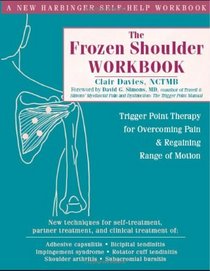Search -
The Frozen Shoulder Workbook: Trigger Point Therapy for Overcoming Pain & Regaining Range of Motion
The Frozen Shoulder Workbook Trigger Point Therapy for Overcoming Pain Regaining Range of Motion
Author:
Powerful Techniques to Relieve Shoulder Pain and Stiffness Author Clair Davies' own case of frozen shoulder led him to undertake an extensive study of trigger points and referred pain that eventually resulted in his best-selling Trigger Point Therapy Workbook. Now this renowned bodywork expert and educator revisits the subject of frozen shoulde... more »
Author:
Powerful Techniques to Relieve Shoulder Pain and Stiffness Author Clair Davies' own case of frozen shoulder led him to undertake an extensive study of trigger points and referred pain that eventually resulted in his best-selling Trigger Point Therapy Workbook. Now this renowned bodywork expert and educator revisits the subject of frozen shoulde... more »
ISBN-13: 9781572244474
ISBN-10: 157224447X
Publication Date: 8/2006
Pages: 285
Rating: 2
ISBN-10: 157224447X
Publication Date: 8/2006
Pages: 285
Rating: 2
5 stars, based on 2 ratings
Publisher: New Harbinger Publications
Book Type: Paperback
Members Wishing: 4
Reviews: Amazon | Write a Review
Book Type: Paperback
Members Wishing: 4
Reviews: Amazon | Write a Review
Genres:




